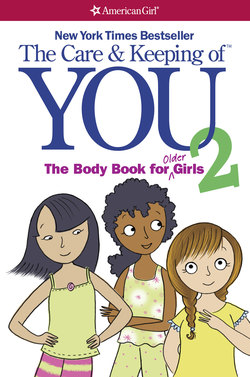Читать книгу The Care and Keeping of You 2 - Cara Natterson - Страница 11
На сайте Литреса книга снята с продажи.
ОглавлениеListen to Your Body
What’s important is not only what you eat but also how
often and how much you eat. Many people eat three
large meals a day—breakfast, lunch, and dinner—but it’s
actually better to eat five smaller meals. If you eat a snack
in the morning, a snack in the afternoon, and reasonable
portions at breakfast, lunch, and dinner, then you are
already doing it!
Don’t forget to pace yourself. Listen to your body, eating
when you are hungry and stopping when you are full.
If you eat extremely fast, you won’t always feel full until
you’ve already eaten too much food. But don’t go too
slowly either, or you won’t have time to finish lunch
at school!
Meal Skipping
Skipping meals typically isn’t a good idea. If you’re sick,
your body might not feel as if it wants solid food, so
drinking water, tea, juice, or soup is fine. But in general,
your body needs food regularly.
The saying “breakfast is the most important meal of the
day” is actually true! That’s because breakfast provides
the fuel to start your day—it gives your body and your
brain the energy to get going. Even if you don’t feel
hungry, it’s a bad idea to skip breakfast. If you do skip it,
you may not have the energy to do well in your early
classes and may be so hungry by lunchtime that you
make bad food choices.
The Real Thing
Is Best
A meal with whole foods is
the best way to get good
nutrition into your body—
this means eating unpro-
cessed foods, such as fresh
fruit instead of fruit gum-
mies, or cheese, yogurt,
meat, or beans instead of
a protein bar. You might
think you can just take a
vitamin to make your diet
a healthy one, but that
doesn’t work, because your
body absorbs nutrients
much better from whole
foods than from a pill.
